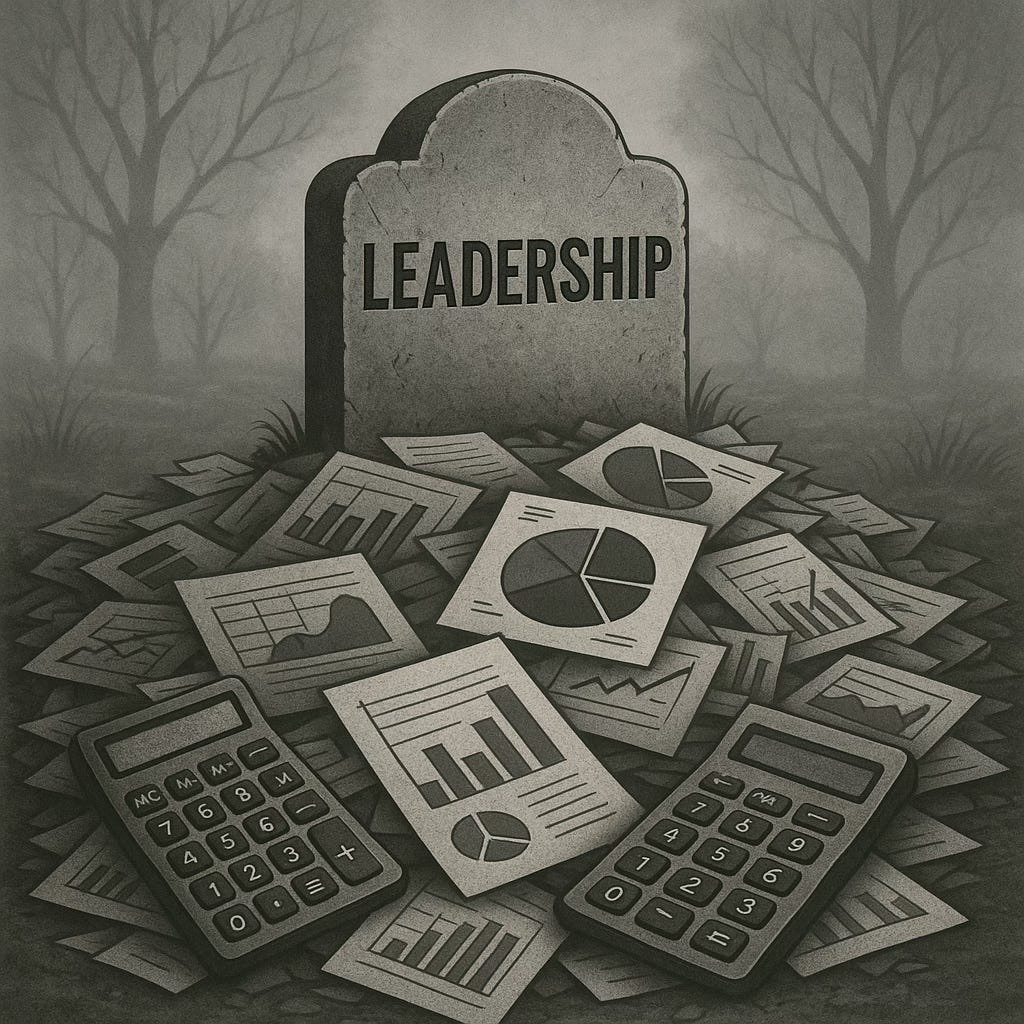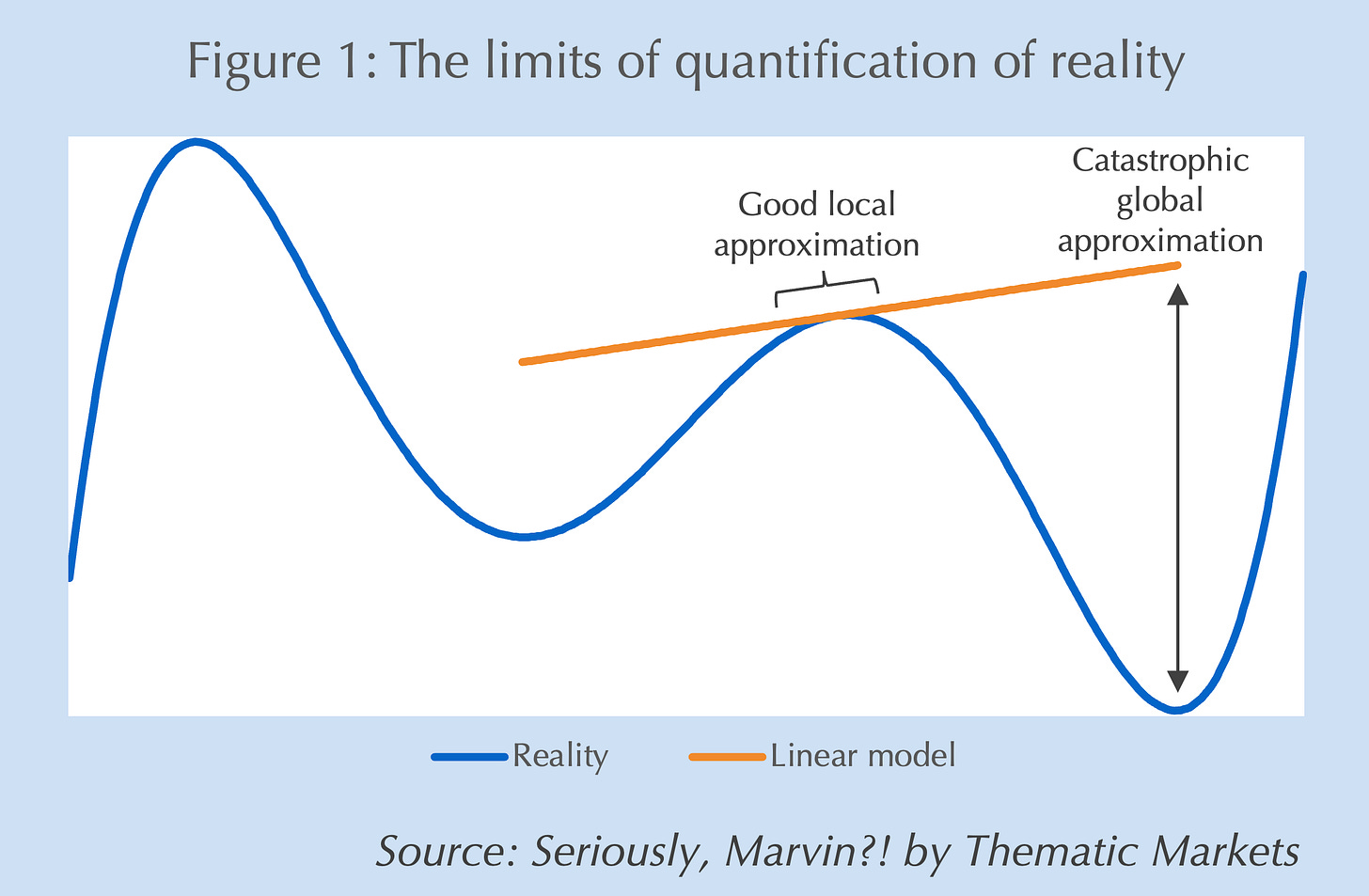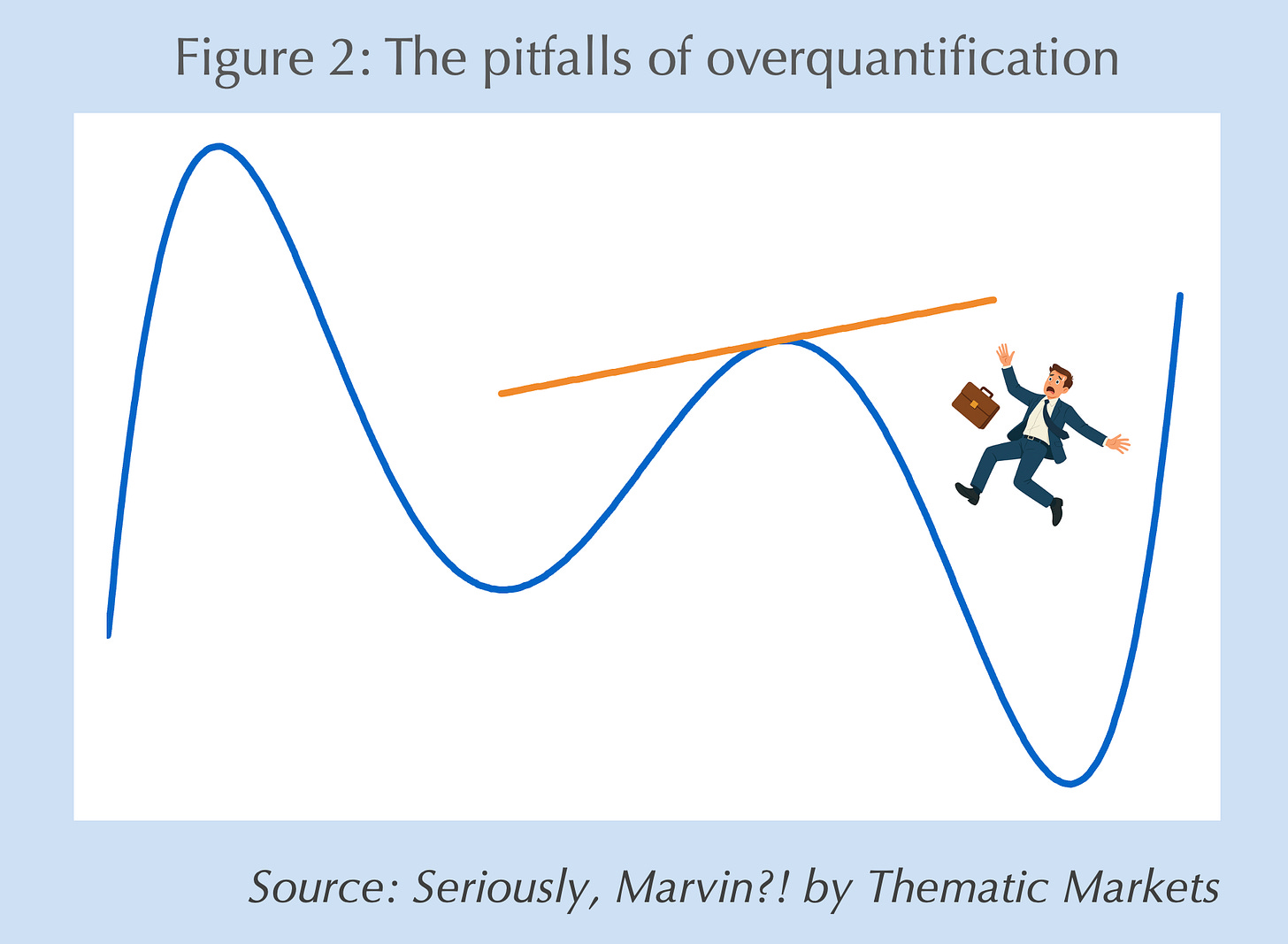Welcome to my new, free Substack: Seriously, Marvin?! If you already read my paid Substack, Thematic Markets, you know that I’m often contrarian and have an unusually good record of being right when I swim against the stream. But I have far more counter-consensus ideas than I have time to research. Rather than let those unresearched ideas perish in the recesses of my mind, Seriously, Marvin?! will be an outlet for my unfiltered random thoughts. While I may not have time to pursue all of these ideas in future research, they still might be of interest to you and stimulate your own thinking. And if you would like me to pursue any of them further in Thematic Markets, please be sure to let me know in the comments!
Excessive reliance on quantification
One long-held idea that I’ve been passionate about but never had good opportunity to write on is the “overquantification” of Western society and its deleterious effects, especially on leadership. By overquantification, I refer to the excessive reliance on quantitative methods for making decisions and evaluating qualifications across modern societies, but especially in the West.
Measurement helps…
There is no denying that measurement in combination with the scientific method has greatly advanced humanity by illuminating phenomena beyond our natural senses, clarifying cause and effect, and facilitating better-informed decisions. But overquantification has its own dangers, leading to a false sense of precision and specialization that can obscure big-picture understanding. Indeed, the very power of quantification for improvement has reinforced the growth of its malign side-effects, particularly in the way we choose leaders.
…but has its limits
Quantification’s ability to improve decisions is generally at the margin. In most non-physical sciences – and even in many physical sciences – we lack sufficient data and theory to estimate anything other than “local” models with linearity assumed for mathematical simplicity. “Global” models that accurately describe more realistic nonlinear systems generally are too complicated to estimate and we have too little data to confirm their fit. Linear modeling around a local peak may help improve our understanding of “nearby” outcomes but will yield terrible predictions at a distance (Figure 1).
The incrementalists take over
To illustrate how overquantification has led to a decline in leadership, imagine that corporate managers face two choices to grow their business: (1) Attempt to grow an underperforming sales demographic for an existing product; or (2) launch an exciting new product with no known competitors. The first option offers a modest increase in revenue with small downside, and the ability to quantify the likelihood of success through statistical methods using data on the target demographic’s preferences, purchasing power, and most frequent advertising and distribution channels. In contrast, the second option offers the potential for spectacular rewards (iPhone) or losses (“New Coke”), but crucially lacks data or precedent for quantifying its likelihood of success.
In business…
Since successful new products are rare but opportunities to expand existing products are plentiful, a world where these are the only two choices managers face will rapidly become dominated by those who always choose the first option, what we might call “n+1” improvement rather than, to use Peter Thiel’s term, “0-to-1” creation. The reason is that while a few of the latter may become hugely successful – the Steve Jobs and Elon Musks of the world – most will fail and lose their jobs. In contrast, “n+1” managers, making use of quantitative methods to improve their odds, will more likely be successful and promoted. In reality, business managers have more than two choices, but most can be distilled into quantifiable marginal improvements that offer a higher likelihood of success or radical options with non-quantifiable risks (Uncertainty). The Darwinian selection of “n+1” managers over their “0-to-1” peers is why few modern CEOs inspire or can be described as “leaders.”
…Politics…
The same process has systematically removed leadership from politics. Politicians using quantitative methods to triangulate single-issue positions to gain marginal improvements in voting coalitions will be more likely to capture the median voter and win elections than candidates campaigning on more substantive but controversial issues or, especially, platforms for change. Just as business has become dominated by mediocre “n+1 incrementalist” CEOs, Western democracies appear littered with indecisive, marginal-issue politicians that inspire no one.
…And art
The phenomenon is also behind music companies’ increasing reliance on “classic rock” royalties and unwillingness to sponsor new artists; and why Hollywood churns out sequel after boring sequel.
Those familiar with the work of Scottish philosopher-neuroscientist Iain McGlichrist will quickly recognize the similarity between what I call overquantification and what he describes as left-brain dominance of our societies.
But their end is nigh
But just as the West is learning that history didn’t end with the Cold War, in complex systems, triumph is only temporary. An overpopulation of rabbits will foster a spike in the fox population that annihilates them. The fossil record is replete with similar periods of species stability interrupted by mass extinctions and rapid evolution to a new equilibrium, so called “punctuated equilibria.” The overpopulation of n+1 incrementalists has sown the seeds of its own demise. Walking too far out the plank of linear approximations eventually leads to a nasty fall into the nonlinear terrain of reality (Figure 2). As readers of Thematic Markets know, I regularly fret about the rising potential for numerous economic, political and geopolitical tipping points, or Complexity cascades as I have called them. All were created by short-sighted, incremental plank-walks in economic, social and foreign policies in the West.
A contrast of substance
Two recent news items reminded me of the crises overquantification has wrought and the potential self-correction: Prime Minister Sir Keir Starmer’s tortured about face on UK immigration policies; and a Financial Times’ interview with Steve Bannon, the reputed intellectual architect of Trumpism.
Sir Keir’s n+1 immigration plans
Sir Keir’s immigration policies were delivered just after sweeping local-election gains by anti-immigration party Reform UK and polling that shows it would win an outright majority in Parliament if a national election were held today. Immigration is a complex issue. While a majority of Britons think the overall pace of immigration is too high, most are generally in favor of student and skilled migrants – especially doctors and nurses to fill rolls in the National Health Service (NHS) – but are less supportive of low-skill immigrants, asylum seekers, and illegal immigrants whom they perceive as pressuring social services.
But in typical n+1 style, Sir Keir’s changes distill the public’s immigration concerns into a simple desire to reduce immigration overall while triangulating to preserve his base given the Labour Party’s traditional empathy for asylum seekers. Hence, his policies restrict the number of students and skilled workers – and make more difficult their path to citizenship – while leaving asylum seekers unaddressed. Unsurprisingly, Sir Keir’s polling numbers have shown the largest one-month drop in history to a new low.
Versus Steve Bannon’s radicalism
In contrast, Mr. Bannon is a zero-to-one revolutionary, not another n+1 incrementalist, as prefaced by Edward Luce’s first question, “Did prison radicalize you? Or were you already radicalized?” Crossing topics as diverse as prison reform, the squeeze of the middle classes, the role of taxation in reversing inequality, a US fiscal crisis, the need to cut spending starting in the Pentagon, deregulation in conjunction with aggressive anti-trust enforcement, deconstruction of the administrative state, trade policy, immigration, and even a schism he predicts within the Catholic Church, Mr. Bannon describes his vision to upend America’s social, economic and foreign policies.
Rather than triangulating single issues to gain a governing majority, Mr. Bannon points to President Trump’s (near-complete) transformation of the Republicans from the party of capital to the party of the working and middle classes, contrasting it with the “credentialed class” Democrats who “abandoned” their traditional voter base and now wholly lack a “theory of the case” (cohesive basis) for their platform of unrelated special interests.
Leadership making a comeback
Mr. Bannon’s vision – whether you like it or not – explains President Trump’s startling political success despite a jarring manner and personality that most disdain: in an electorate weary of n+1ism, President Trump offers leadership, a radical path of reform that is nonquantifiable. Note, if you bristle at my characterization of President Trump (or Mr. Bannon) as a “leader,” I am referring to decision-making style and not making a value judgement on policies. Thus, while one can apply moral judgement to the paths chosen by FDR, Churchill, Stalin, and Hitler, all are accurately described as leaders in my view.
(As a sidenote, Mr. Bannon’s advocacy for tax rates of “40%, as start” for the “wealthy” jibes with recent utterances from President Trump on upper-income-bracket tax hikes and should be a wake-up call for anyone expecting traditional Republican tax policy from the Trump Administration.)
Think globally, act locally
When I was young, a popular slogan among activists was “Think globally, act locally.” Framing my takeaways in those terms, globally you should continue to expect, as I warned in my preview of Trump 2.0 (free at Thematic Markets), sustainedly higher volatility of volatility, i.e. asset prices, interest rates and exchange rates that oscillate between extreme volatility and brief periods of exhausted stability. Locally, focus on developing leadership skills in yourself, your employees and your kids, since these skills will be desperately needed amid increasing Uncertainty. If you are a concerned citizen, seek and vote for candidates who are willing to challenge the consensus, not tack with each poll. And go to a club to see an up-and-coming band play rather than to the movies to see yet another Marvel sequel.







Excellent work Marvin and readable without the need for a 3rd cup of coffee - always a good test!
Great Expectations :) https://www.federalreserve.gov/econres/feds/files/2021062pap.pdf